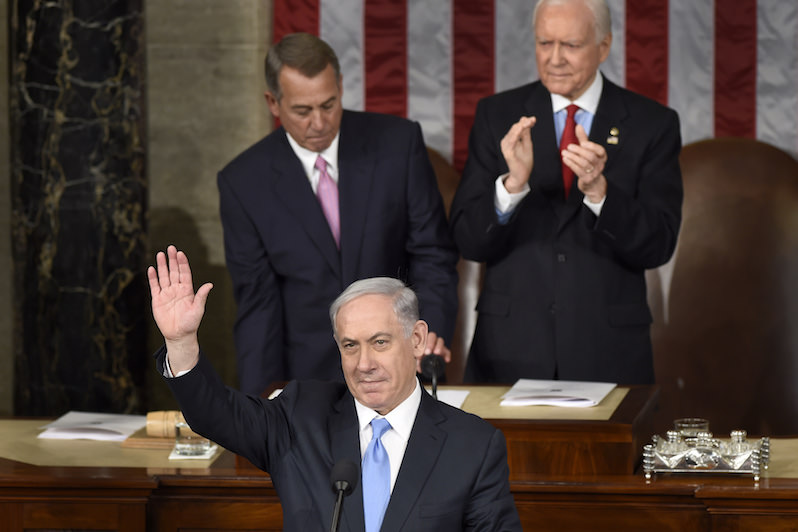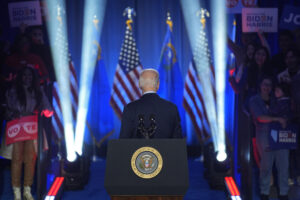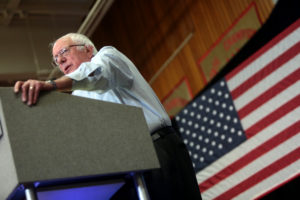In the Shadow of FDR, Netanyahu Preaches a Politics of Fear
Eighty-two years after Roosevelt's famous call to hope, the Israeli prime minister stood before Congress to deliver a nearly opposite appeal. The facts do not support his dire warning on Iran. Israeli Prime Minister Benjamin Netanyahu waves as he speaks before a joint meeting of Congress on Capitol Hill in Washington on Tuesday. (AP / Susan Walsh)
Israeli Prime Minister Benjamin Netanyahu waves as he speaks before a joint meeting of Congress on Capitol Hill in Washington on Tuesday. (AP / Susan Walsh)
On March 4, 1933, in his first inaugural address, Franklin Delano Roosevelt delivered a message of hope to a troubled, disillusioned and divided nation.
Standing stoically behind a lectern on the East Portico of the Capitol, his legs withered by polio, the new president urged his listeners not to “shrink from honestly facing conditions in our country today” that had been wrought by the “outworn” traditions of a “false leadership” but to look forward to bold new initiatives that promised revival and shared prosperity. Above all, he urged them not to despair, famously declaring that “the only thing we have to fear is fear itself—nameless, unreasoning, unjustified terror which paralyzes needed efforts to convert retreat into advance.”
On Tuesday morning, 82 years minus a day from FDR’s oration, Israeli Prime Minister Benjamin Netanyahu delivered nearly the opposite message before a joint session of Congress assembled in the ornate House chamber of the Capitol.
Invited to Washington by House Speaker John Boehner to air his views on the continuing multilateral nuclear arms negotiations with Iran, Netanyahu stood at the same lectern where President Obama had given January’s State of the Union address. Striking a stern and sobering tone in a lengthy discourse laced with biblical references to the Jewish Queen Esther and to Moses and with frequent invocations of the Holocaust, Netanyahu urged his audience to join him in rejecting the negotiations, which, he insisted, are destined to fail. Above all, in so many words, he urged his audience not to let down their military guard but to remain afraid — very, very afraid of the potential for annihilation at the hands of a nuclear Iran.
Now don’t get me wrong, I have no illusions that Barack Obama is the second coming of FDR, or that it isn’t vitally important to stop Iran — or any other country, for that matter — from developing or deploying nuclear weapons. Nor do I contest Netanyahu’s right to speak his mind, even though his invitation to Capitol Hill was brokered behind the president’s back, breaching long-established diplomatic protocol, and was crassly timed to bolster Netanyahu’s prospects as leader of the right-wing Likud Party in the Israeli general elections slated for March 17.
Viewing Netanyahu’s appearance as a direct slap in the president’s face, some 50 to 60 Democratic members of the House and Senate boycotted the speech. Obama and Vice President Biden were also among the no-shows.
For me, the principal issue raised by Netanyahu’s address isn’t one of political decorum. Nor is it one of free speech, as some of Netanyahu’s American backers have charged. The principal issue is one of judgment and content.
Having exercised his right to speak, Netanyahu, like anyone else, must be held accountable for what he says. It doesn’t matter that he has now tied Winston Churchill’s record for most joint-session speeches by a foreign dignitary by delivering three (Netanyahu’s others were given in 1996 and 2011), or that his neocon admirers insist on comparing him with Winnie holding back the Nazi tide. He doesn’t get a pass.
What, then, did the prime minister offer beyond the hawkish scoldings that have been his trademark since he declared as a member of the Knesset in 1992 that Iran was just three to five years away from being able to produce a nuclear bomb?
As he did in his lecture Monday to the American Israeli Public Affairs Committee, Netanyahu began with the implausible disclaimer that he had no intention of injecting himself into the United States’ partisan political turmoil. The U.S.-Israeli alliance, he said, “has always been above politics.” Never mind that no one has been more skilled over the past three decades at manipulating American political opinion. His purpose was not to agitate but to inform.
Confident and eloquent as always, with his introduction concluded, Netanyahu proceeded to deconstruct what he claimed were the basic elements of a “bad deal” that would not halt Iran’s progress toward creating a bomb but would instead guarantee “the path to a bomb.” Those elements, he added, had already been publicly disclosed; he invited his listeners to “Google it” if they had any doubts.
The fundamental flaws in the deal, he said, were twofold: First, the deal left Iran with its nuclear infrastructure intact. Not a single nuclear facility or centrifuge would be destroyed or dismantled; and within a year or less, if it chose to violate the agreement, Iran would be able to “break out” and build a bomb.
Second, and even worse, the deal would contain a sunset provision of 10 years. After that, he argued, Iran would be freed from all restraints and economic sanctions and be better equipped than ever to export terror across the globe. Ten years may seem like a long time, he said, but “it goes by in the blink of an eye in the life of a nation or in the lives of our children.”
Instead of the bad deal on the table, Netanyahu urged one that would demand that Iran give up its nuclear facilities entirely and keep all sanctions in place until it demonstrated a commitment to renounce terror and its long-held goal of destroying the world’s only Jewish state.
It all sounded inspiring and persuasive, especially against the backdrop of the numerous standing ovations Netanyahu received. But then there are the facts the speech ignored.
Contrary to Netanyahu’s dark forecast — and I invite you, as he advised, to Google it—the deal is anything but done. It was and remains, as Secretary of State John Kerry reminded us on Monday, a work in progress.
Nor will the deal, if finalized, be exclusively the Obama administration’s handiwork. From the outset, negotiations have been conducted by a multinational team of diplomats drawn from what is called the P5+1 group, consisting of the five permanent members of the United Nations Security Council (consisting of the United States, Great Britain, France, China and Russia) and Germany. If the deal falls apart, it won’t just be Obama’s failure but the world’s. The aim of the P5+1 is not to provide Iran with a pathway to the bomb. It’s just the opposite. As a recent article in the Washington Post explains in language that even non-science-oriented types can grasp, the goal is to put Iran in an “iron box” replete with limits on the number of centrifuges it may retain for civilian purposes, restrictions on its ability to enrich uranium, and the requirement that it submit to a rigorous and ongoing regime of international inspections to prevent it from secretly breaking out of the box.
Will the effort succeed? Under the terms of an interim agreement negotiated by the P5+1, Iran has divested itself of its stockpiles of 20 percent uranium gas (the enrichment level immediately below the 70-to-90-percent level required to equip the core of an atomic bomb), and it has stopped making any more.
But the interim agreement expires June 30, and the P5+1 faces a March 24 deadline to hammer out the framework of a final arrangement. The clock — not the bomb — is ticking.
I don’t know why Netanyahu omitted this information from his address. I do know, however, that he has committed egregious errors of judgment in the past.
In 2002, while briefly out of political office, he testified before the House Committee on Government Reform to express his support for the Bush administration’s planned pre-emptive war on Iraq. When asked by Democratic Rep. Dennis Kucinich what other pre-emptive strikes he might support, Netanyahu referenced Libya and Iran but speculated that if then-Iraqi leader Saddam Hussein were overthrown, the Iranian regime might well “implode” from within.
Ten years later, with the Iranian regime far from imploded, Netanyahu addressed the U.N. General Assembly. He held up a cartoon poster of an exploding bomb worthy of Wile E. Coyote to illustrate that Iran was imminently close to crossing a nuclear red line of no return. He didn’t disclose that his own intelligence service, the Mossad, had briefed him that Iran in fact was “not performing the activity necessary to produce [nuclear] weapons.”
Facts, however, are disposable when they get in the way of an unrelenting narrative of fear. And fear, as the Israeli sociologist Eva Illouz wrote last month in an op-ed published by the Tel Aviv-based newspaper Haaretz, has been Netanyahu’s secret weapon, the key to his “bizarre success: his self-appointment as the proud and forceful representative of world Jewry, and his apocalyptic invocation of imminent and overwhelming danger.”
Fear, as FDR told us so many years ago, is also paralyzing. It forces us to look backward for solutions rather than ahead. It leads not only to wars abroad but also to warlike practices at home, to the erosion of civil liberties and the exponential growth of unchecked government surveillance.
Yes, we have to be brave in the face of danger, but we also have to be smart. We can start by letting the Iran negotiators finish their job. Above all, we can’t allow fear to get in the way.
Your support matters…Independent journalism is under threat and overshadowed by heavily funded mainstream media.
You can help level the playing field. Become a member.
Your tax-deductible contribution keeps us digging beneath the headlines to give you thought-provoking, investigative reporting and analysis that unearths what's really happening- without compromise.
Give today to support our courageous, independent journalists.






You need to be a supporter to comment.
There are currently no responses to this article.
Be the first to respond.